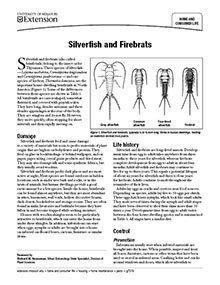

Silverfish and Firebrats
Reviewed
Control silverfish and firebrats by lowering humidity, sealing entry points, and removing starchy materials they feed on.
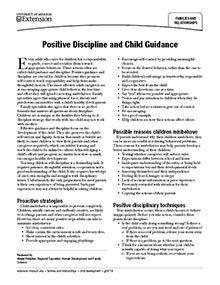
Positive Discipline and Child Guidance
Revised
Adults who care for kids have a responsibility to guide them toward good behaviors. Visit our site to learn about positive discipline and child guidance.
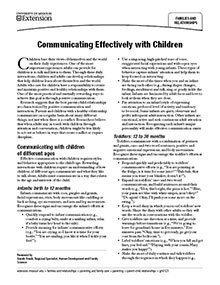
Communicating Effectively With Children
Revised
The best parent-child relationships are characterized by positive communication. Visit our site to learn about communicating effectively with children.
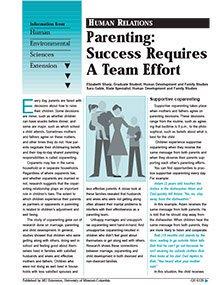
Parenting: Success Requires A Team Effort
Reviewed
Explore strategies for effective co-parenting to support children's development through consistent communication and shared decision-making.
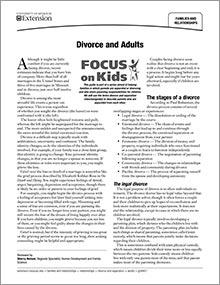
Divorce and Adults
Revised
Coping with the emotional, legal, and financial changes after divorce can be challenging. Get practical guidance for adjusting to life post-separation.
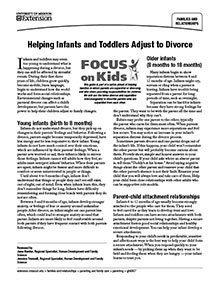
Helping Infants and Toddlers Adjust to Divorce
Revised
Parental divorce can negatively affect a child's development. Visit our website today to learn about helping infants and toddlers adjust to divorce.
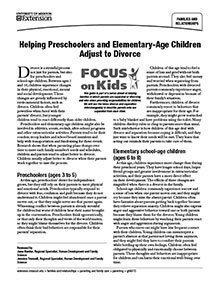
Helping Preschoolers and Elementary-Age Children Adjust to Divorce
New
Learn how preschoolers and elementary-aged children respond to divorce and discover strategies to support their emotional adjustment.
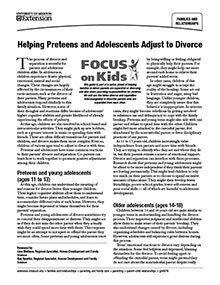
Helping Preteens and Adolescents Adjust to Divorce
New
Preteens and adolescents have some common reactions to their parents' divorce or separation. If you are in this situation, learn how co-parents can work together to promote children’s positive adjustment in this University of Missouri Extension guide.
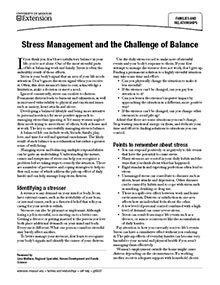
Stress Management and the Challenge of Balance
Revised
If you think you don't have satisfactory balance in your life, you're not alone. One of the most stressful parts of life is balancing work and family. Stress is often the unhealthy result of those efforts.
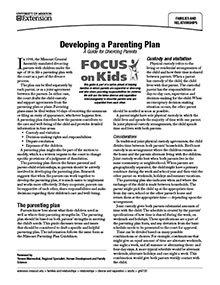
Developing a Parenting Plan: A Guide for Divorcing Parents
Reviewed
Assists divorcing parents in creating a comprehensive parenting plan, covering custody, visitation, decision-making, dispute resolution, and child expenses.
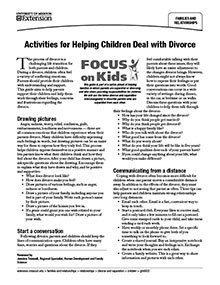
Activities for Helping Children Deal With Divorce
Revised
Discover strategies and activities to support children navigating the challenges of divorce, fostering emotional expression and open communication.
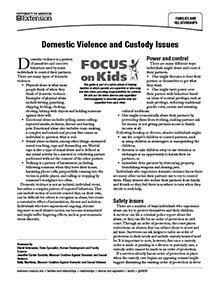
Domestic Violence and Custody Issues
Revised
Learn how domestic violence affects custody decisions, including types of abuse, legal protections, and strategies to protect children and survivors.
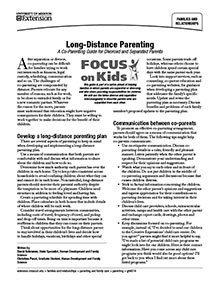
Long-Distance Parenting: A Co-Parenting Guide for Divorced and Separated Parents
New
Practical strategies for divorced or separated parents managing long-distance co-parenting, focusing on communication, consistency, and children's well-being.
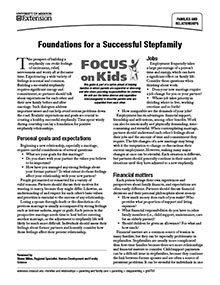
Foundations for a Successful Stepfamily
Reviewed
Discover strategies to build a healthy stepfamily by setting realistic expectations, discussing roles, and addressing financial and parenting challenges.
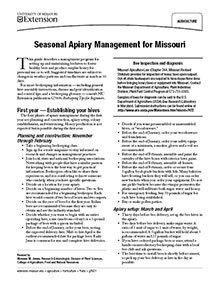
Seasonal Apiary Management for Missouri
Revised
Learn how to establish, manage and maintain beehives to foster healthy bees and produce surplus honey to use or sell. Flowering periods for Missouri honey plants are included in this University of Missouri Extension guide.
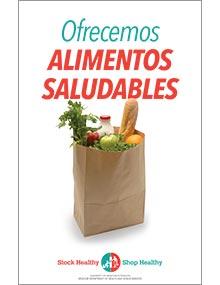
Stock Healthy, Shop Healthy: Sign — We Stock Healthy (front door sign or window cling; 4 x 6 inches) (Spanish)
Revised
Retailers participating in the Stock Healthy, Shop Healthy program can use this 4-by-6-inch Spanish sign or window cling (or English version) to let customers know they are stocking more healthy foods. Learn about this healthy community program.
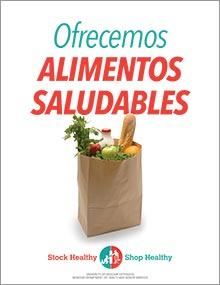
Stock Healthy, Shop Healthy: Sign — We Stock Healthy (small: 8.5 x 11 inches) (Spanish)
Revised
Retailers participating in the Stock Healthy, Shop Healthy program can use this 8.5-by-11-inch Spanish sign (or English version) to let customers know they are stocking more healthy foods. Learn about this program that aims to create healthy communities.
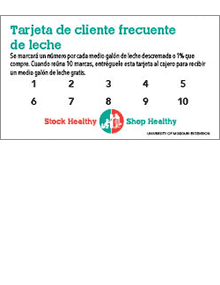
Stock Healthy, Shop Healthy: Loyalty Card — Milk (Spanish)
Revised
Reward customers for buying skim or 1% milk. This Spanish loyalty card, which encourages healthy food purchases, was created for small food-retailers in the Stock Healthy, Shop Healthy program. Also available in English. Print, cut, distribute, punch.
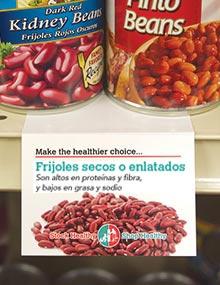
Stock Healthy, Shop Healthy: Shelf Talkers (Spanish)
Revised
Small food-retailers participating in the Stock Healthy, Shop Healthy program, help your Spanish-speaking customers make the healthier choice by posting these shelf talkers to present health information about various products. Download, print and hang!
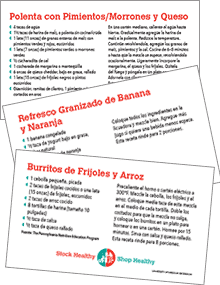
Stock Healthy, Shop Healthy: Recipe Cards (Spanish)
New
These recipe cards are for stores participating in the Stock Healthy, Shop Healthy program to share with their Spanish-speaking customers to encourage healthy eating.
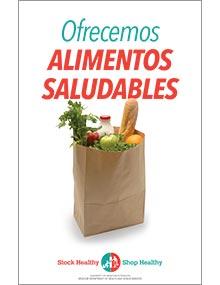
Stock Healthy, Shop Healthy: Sign — We Stock Healthy (large: 24 x 36 inches) (Spanish)
Revised
Retailers participating in the Stock Healthy, Shop Healthy program can use this 24-by-36-inch Spanish sign (or English version) to let customers know they are stocking more healthy foods. Learn about this program that aims to create healthy communities.
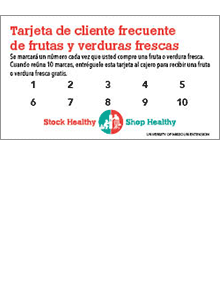
Stock Healthy, Shop Healthy: Loyalty Card — Fresh Produce (Spanish)
Revised
Reward customers for buying fresh produce. This Spanish loyalty card, which encourages healthy food purchases, was created for small food-retailers in the Stock Healthy, Shop Healthy program. Also available in English. Print, cut, distribute, punch.
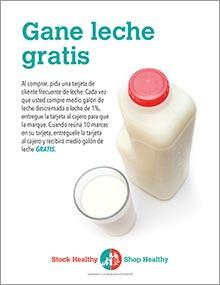
Stock Healthy, Shop Healthy: Loyalty Program Sign — Milk (Spanish)
Revised
Encourage customers to buy skim or 1% milk by offering a loyalty program that offers a free half gallon after the purchase of 10. Post this Spanish sign to promote the program. Also available in English. Learn more about Stock Healthy, Shop Healthy today.
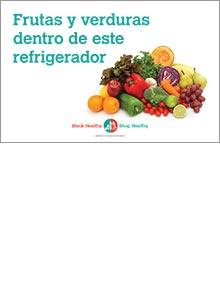
Stock Healthy, Shop Healthy: Sign — Fruits and Veggies in Cooler (half page) (Spanish)
Revised
Retailers participating in the Stock Healthy, Shop Healthy program can use this 8.5-by-5.5-inch Spanish sign (or English version) to alert customers to the presence of fruits and vegetables in a cooler. Learn about this healthy community program.
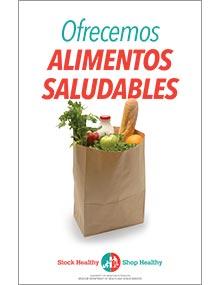
Stock Healthy, Shop Healthy: Sign — We Stock Healthy (medium: 11 x 17 inches) (Spanish)
Revised
Retailers participating in the Stock Healthy, Shop Healthy program can use this 11-by-17-inch Spanish sign (or English version) to let customers know they are stocking more healthy foods. Learn about this program that aims to create healthy communities.